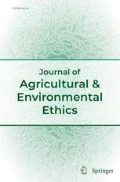Abstract
Knowledge of the backgrounds of students of behaviour working in the field of applied animal behavior science may help us to recognize their influence on conclusions reached in a particular study and on more general points of view. This recognition may result in a speed up of the progress in this science, to the benefit of science and animals. Some types are: (1) Eco-ethologists (ethologists of the hunters-type). They like to stalk healthy wild animals in their natural environment. They are less interested in the abnormal behavior of domestic animals under husbandry circumstances. (2) Behaviorists. These are psychologists that still think in a man-animal dichotomy. They are not interested in animals for their own sake but as models for human behavior. (3) Behavior physiologists. These biologists are not primarily interested in behavior. Because of the type of experiments they perform they have an aversity against animal protectionists. (4) Ethologists of the farmers type. These ethologists want to posses animals, collect animal species, take care of them and breed them. They are able to speak on approximately the same wavelength as farmers as well as animal protectionists. (5) Zootechnicians of the farmers type. These scientists want to make a living out of animals and like to take care for them. They are also able to speak at approximately the same wavelength as farmers and animal protectionists.
Similar content being viewed by others
References
Beilharz, R.G. 1982. Genetic adaptation in relation to animal welfare.International Journal for the Study of Animal Problems 3:177–24.
Griffin, D.R. 1976.The question of animal awareness. New York: Rockefeller University Press.
Lorenz, K. 1978.Vergleichende Verhaltensforschung. Wien: Springer Verlag.
Popper, K.R., and J.C. Eccles. 1977.The self and its brain. New York: Springer.
Timmermans, P.J.A. 1984. Waar de hond rechten krijgt, gaat de baas aan de ketting.De Volkskrant (Open Forum)(, 12 January.
Van Rooijen, J. 1983a. Awareness and Griffin's circular reasoning.Animal Behaviour 31:613–14.
——. 1983b. Genetic adaptation and welfare.International Journal for the Study of Animal Problems 4:191–97.
——. 1984a Impoverished environments and welfare.Applied Animal Behaviour Science 12:3–13.
--. 1984b. Dierproeven zijn niet vanzelfsprekend.De Volkskrant (Open Forum), 26 January.
——. 1985.De-Evidenz, applied ethology and animal welfare.British Veterinary Journal 141:245–48.
——. 1987. Interactionism and evolution: A critique of Popper.British Journal for the Philosophy of Science 38:87–92.
Wiepkema, P.R. 1981. On the identity and significance of disturbed behavior in vertebrates. InDisturbed Behaviour in Farm Animals, ed. W. Bessei, 7–17. Hohenheimer Arbeiten, 121. Stuttgart: Verlag Eugen Ulmer.
Author information
Authors and Affiliations
Rights and permissions
About this article
Cite this article
van Rooijen, J. Backgrounds of students of behavior in relation to their attitude toward animal well-being. Journal of Agricultural Ethics 2, 235–240 (1989). https://doi.org/10.1007/BF01826973
Issue Date:
DOI: https://doi.org/10.1007/BF01826973




